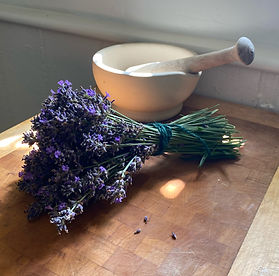
Lavender (Lavandula angustifolia) is known as the universal essential oil because of its many uses. Lavender belongs to the mint family. Lavender is highly regarded as a multifaceted oil with that blends beautifully with many other Young Living Essential Oils.
Lavender became known to the modern scientific world when the French scientist Rene Gattefosse severely burned his arm in a laboratory accident. He dipped his arm into lavender in a boiler container, thinking that it was water, but an assistant had put a container of lavender in its place. The severe burn had no scarring due to the use of the lavender oil. As a result, he personally experienced the ability of lavender to promote tissue regeneration.
History of Lavender
The use of lavender can be traced back 2500 years. The Egyptians used lavender to preserve mummies. The Romans used lavender to ward off insects. Lavender sachets have been used for hundreds of years to add a sweet scent to a drawer, closet or room. A bouquet of dried lavender flowers is another approach to added the aroma of lavender to a room. Modern diffusers are probably the most effective way to disperse the smell and powerful benefits of lavender.
Growing Lavender Plants
Lavender prefers dry, sandy soil. Different varieties of lavender bloom at different times in the growing season, so it is possible to have lavender blooming in your garden from mid spring through the end of the summer for a fragrant garden. Modern studies indicate that both men and women have a positive reaction to the scent of lavender. In fact, lavender is often considered to be an aroma conducive to both relaxation and romance.
Healing Properties of Therapeutic Grade Lavender
Lavender is anti-inflammatory, reduces blood fat/cholesterol, alleviates skin rashes, fungal conditions, has vasodilating properties, is anti-tumeral, is effective for scalp problems and removes excess sebum on the skin. Lavender is also helpful for PMS, eczema, psoriasis acne, scarring, burns, insomnia, nervous tension and is a natural antiseptic.

Emotional and Psychological Properties
Lavender is known for calming and relaxing. Lavender has been shown to be balancing, improve mental acuity, improve concentration, reduce depression and increase alertness. Lavender is a fragrance well remembered and the brain is able to recall past experience of its pleasant effect.
Lavender Essential Oil Quality
Dr. Sabina DeVita EdD, RNCP, DNM, an Aspirations LLC leader, wrote about her personal experience when viewing the Young Living Lavender fields in LaProvence de France. She was affected by the exquisite view of the Lavender fields and their soothing flowery aroma. She says the following: "Consumers should be aware of the difference between perfume-grade lavender and therapeutic-grade lavender. Every day consumers unknowingly purchase pseudo-aromatherapy products. In France, it is common for medical doctors to prescribe essential oils and blends for internal use--to be taken orally in capsule or in a diluted liquid form. French pharmacists have been preparing natural medicine prescriptions for over 50 years."
"Approximately 95% of the products sold as aromatherapy are not therapeutic grade or healing oils."
How to Use Lavender
Lavender can be inhaled directly from the bottle, diffused, apply topically neat (undiluted) or applied after mixing with a carrier oil, or taken as a dietary supplement in food grade capsules. To diffuse place 5-6 drops in your ultrasonic diffuser, sit back and enjoy.




